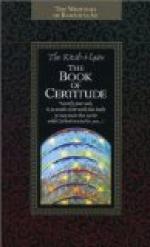The Bab, the Lord, the most exalted—may the life of all be a sacrifice unto Him,—hath specifically revealed an Epistle unto the divines of every city, wherein He hath fully set forth the character of the denial and repudiation of each of them. “Wherefore, take ye good heed ye who are men of insight!"(177) By His references to their opposition He intended to invalidate the objections which the people of the Bayan might raise in the day of the manifestation of “Mustaghath,"(178) the day of the Latter Resurrection, claiming that, whereas in the Dispensation of the Bayan a number of divines have embraced the Faith, in this latter Revelation none of these hath recognized His claim. His purpose was to warn the people lest, God forbid, they cling to such foolish thoughts and deprive themselves of the divine Beauty. Yea, these divines to whom We have referred, were mostly unrenowned, and, by the grace of God they were all purged of earthly vanities and free from the trappings of leadership. “Such is the bounty of God; to whom He will He giveth it.”
Another proof and evidence of the truth of this Revelation, which amongst all other proofs shineth as the sun, is the constancy of the eternal Beauty in proclaiming the Faith of God. Though young and tender of age, and though the Cause He revealed was contrary to the desire of all the peoples of earth, both high and low, rich and poor, exalted and abased, king and subject, yet He arose and steadfastly proclaimed it. All have known and heard this. He was afraid of no one; He was regardless of consequences. Could such a thing be made manifest except through the power of a divine Revelation, and the potency of God’s invincible Will? By the righteousness of God! Were any one to entertain so great a Revelation in his heart, the thought of such a declaration would alone confound him! Were the hearts of all men to be crowded into his heart, he would still hesitate to venture upon so awful an enterprise. He could achieve it only by the permission of God, only if the channel of his heart were to be linked with the Source of divine grace, and his soul be assured of the unfailing sustenance of the Almighty. To what, We wonder, do they ascribe so great a daring? Do they accuse Him of folly as they accused the Prophets of old? Or do they maintain that His motive was none other than leadership and the acquisition of earthly riches?
Gracious God! In His Book, which He hath entitled “Qayyumu’l-Asma,”—the first, the greatest and mightiest of all books—He prophesied His own martyrdom. In it is this passage: “O thou Remnant of God! I have sacrificed myself wholly for Thee; I have accepted curses for Thy sake; and have yearned for naught but martyrdom in the path of Thy love. Sufficient Witness unto me is God, the Exalted, the Protector, the Ancient of Days!”




